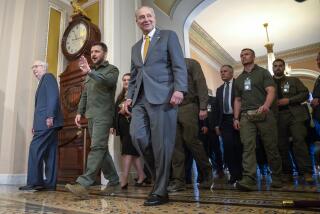Fewer Americans Back War in Iraq, Surveys Find
WASHINGTON — After remaining steady for months, Americans’ support for U.S. military action in Iraq has softened in recent weeks, two polls indicated Wednesday.
The apparent drop in enthusiasm for war comes as U.S. officials report progress in U.N. negotiations aimed at crafting a resolution that would send weapons inspectors back to Iraq and possibly set the stage for a U.S. invasion.
Secretary of State Colin L. Powell said Wednesday that U.N. Security Council members were getting much closer to agreeing on a resolution and that he expects work to be completed before the end of next week.
Powell also said he believes it will take “a matter of months” once inspections begin for U.N. weapons experts to determine whether Iraq is producing weapons of mass destruction. His comments suggest that any military action might not occur before late winter.
A poll conducted by the Pew Research Center from Oct. 17 to Oct. 27 found that 55% of Americans support an attack on Iraq. That was down from 62% earlier in the month and 64% in August.
The poll found that a large percentage of Americans are worried about the possible consequences of a military campaign, including high U.S. casualties and increased terrorist attacks on the United States. And it indicated that Americans are reluctant to back military action unless the United States has support from allies.
A poll by Fox News with slightly different wording found that support for a military campaign had declined from 72% to 62% in recent weeks. But a Gallup Poll conducted Oct. 21-22 showed no decline.
Carroll Doherty, editor at the Pew Research Center, said he believes that the slippage is noteworthy after months of stability. He said the dip may reflect the fact that President Bush has not been actively campaigning recently to build nationwide support for military action.
John Gorman, president of Opinion Dynamics Corp., which conducted the poll for Fox, said the decline may reflect the fact that news coverage of the possible war with Iraq has evolved into a story about U.N. diplomacy “that is inherently confusing. Without constant reinforcement of the importance of this, support erodes.”
He said the erosion may also reflect, to a lesser extent, the fact that opponents of the war have become more visible in recent days.
The Pew poll, which sampled the views of 1,751 adults, found increased opposition to the war among Democrats. For the first time since the debate over the war intensified last summer, a minority of Democrats, 49%, support the war.
Like earlier polls, this survey suggested that Bush needs allied support to keep U.S. public backing for an attack on Iraq. Twenty-seven percent said they would favor military action if allies did not go along, down from 33% in mid-September.
In Washington, officials continued to press forward in their planning.
Bush met for 10 minutes at the White House with chief U.N. weapons inspector Hans Blix and Mohammed Baradei, head of the International Atomic Energy Agency. Blix and Baradei also met with Powell, Vice President Dick Cheney and National Security Advisor Condoleezza Rice.
Ari Fleischer, the White House press secretary, described the meetings as part of a round of consultations Blix is conducting in the capitals of the five permanent members of the Security Council.
Powell, in an interview with National Public Radio, was asked how long the United States would wait to see how inspections were faring.
“It’s certainly a matter of months before Dr. Blix and ... Mr. El Baradei would come back and say we have made our determination whether or not [the Iraqis] are continuing to pursue this kind of technology,” Powell said. “We understand that it will take time, and the president understands that means that we will have to wait for them to do their work and complete their report.”
One U.S. official suggested this week that if the Security Council appeared headed toward failure in its negotiations, the Bush administration might delay the outcome until after election day -- to avoid an embarrassing defeat, and heightened fears of war, just before voters head to the polls.
But other officials said the negotiations were still making progress toward a compromise. They added that in any case, U.N. negotiations almost always take longer than planned.
*
Staff writer James Gerstenzang contributed to this report.
More to Read
Sign up for Essential California
The most important California stories and recommendations in your inbox every morning.
You may occasionally receive promotional content from the Los Angeles Times.












